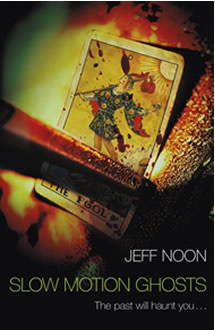Reviewed by Robert Goodman.
By Jeff Noon, Penguin, $32.99.
 Jeff Noon is best known for his speculative and science fiction, in particular his Arthur C Clark Award winning debut Vurt. But in Slow Motion Ghosts, an historical police procedural set in London and the south of England in 1981, finds Noon firmly in the crime genre.
Jeff Noon is best known for his speculative and science fiction, in particular his Arthur C Clark Award winning debut Vurt. But in Slow Motion Ghosts, an historical police procedural set in London and the south of England in 1981, finds Noon firmly in the crime genre.
Slow Motion Ghosts opens during the Brixton riots. Henry Hobbes, a police detective is leading a group of police into the fray against rioting youth. Six months later he has been transferred to another police station and is in disgrace. Something that happened in the aftermath of the riots involving him and colleague has stained his reputation. But he and his new team need to put that aside to solve the murder of a musician, killed in bizarre circumstances.
Brendan Clarke was the lead singer of Monsoon, Monsoon a three piece tribute band to glam rocker Lucas Bell. Clarke was obsessed with Bell who in the mid 70s took on the persona of King Lost, complete with white mask and concept album. Bell killed himself in 1974 after a famous concert in which he symbolically cut the mask off his face. Clarke himself is killed after reproducing that concert with his band, he is found with his face disfigured with the patterns on Bell’s mask. As the investigation continues, the connections with Bell, his followers and the circumstances surrounding his death grow.
Hobbes is the type of character crime readers will have encountered before. A policeman who stands for an honest Force, who puts not only his colleagues offside by taking a stand against the corruption of those values. His single minded dedication to the job has also estranged him from his family. But despite being aware of this, Hobbes commits himself to solving murders and bringing his team, reluctant as they are to trust him, along. While these is a fairly common procedural backstory, Noon manages to give enough colour to create a sympathetic and engaging protagonist.
And Noon also captures a moment in time not only in Margaret Thatcher’s England but also the glam rock era of the 1970s. The only disappointing aspect is that the Brixton Riots, which provide a visceral lead-in to the tale, connect only tangentially to a story and neither its origins or its aftermath are really explored. Noon is much more interested in the glam rock music scene, the fanatical devotion of its followers and its connections to the occult.
In Slow Motion Ghosts, Noon successfully shifts genres to deliver a solid and clever police procedural. While the mysteries and plot threads are mostly tied up, Noon has developed an engaging cast operating in an fascinating time period and it would be no surprise if there are future outings for DI Hobbes and his team.
This and 300 more reviews can be found at Pile By the Bed.










